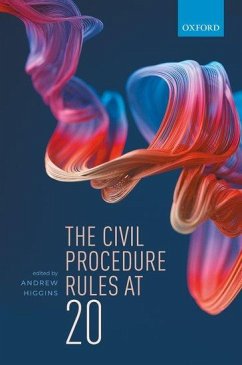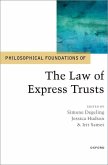The Civil Procedure Rules at 20
Herausgeber: Higgins, Andrew
The Civil Procedure Rules at 20
Herausgeber: Higgins, Andrew
- Gebundenes Buch
- Merkliste
- Auf die Merkliste
- Bewerten Bewerten
- Teilen
- Produkt teilen
- Produkterinnerung
- Produkterinnerung
Civil Procedure Rules at 20 considers the successes and failures of the CPR, and current challenges faced by those designing, administering, and using the civil justice system.
Andere Kunden interessierten sich auch für
![A Model Civil Procedure Code for England and Wales A Model Civil Procedure Code for England and Wales]() John SorabjiA Model Civil Procedure Code for England and Wales240,99 €
John SorabjiA Model Civil Procedure Code for England and Wales240,99 €![Eli - Unidroit Model European Rules of Civil Procedure Eli - Unidroit Model European Rules of Civil Procedure]() Eli - Unidroit Model European Rules of Civil Procedure149,99 €
Eli - Unidroit Model European Rules of Civil Procedure149,99 €![Civil Procedure and Eu Law Civil Procedure and Eu Law]() StorskrubbCivil Procedure and Eu Law154,99 €
StorskrubbCivil Procedure and Eu Law154,99 €![The Canadian Yearbook of International Law = Annuaire Canadien De Droit International; 20 The Canadian Yearbook of International Law = Annuaire Canadien De Droit International; 20]() AnonymousThe Canadian Yearbook of International Law = Annuaire Canadien De Droit International; 2042,99 €
AnonymousThe Canadian Yearbook of International Law = Annuaire Canadien De Droit International; 2042,99 €![The Legal News, Volume 20 The Legal News, Volume 20]() James KirbyThe Legal News, Volume 2042,99 €
James KirbyThe Legal News, Volume 2042,99 €![Annual Report of the State Board of Lunacy and Charity of Massachusetts, Volume 20 Annual Report of the State Board of Lunacy and Charity of Massachusetts, Volume 20]() Annual Report of the State Board of Lunacy and Charity of Massachusetts, Volume 2038,99 €
Annual Report of the State Board of Lunacy and Charity of Massachusetts, Volume 2038,99 €![Philosophical Foundations of the Law of Express Trusts Philosophical Foundations of the Law of Express Trusts]() Philosophical Foundations of the Law of Express Trusts132,99 €
Philosophical Foundations of the Law of Express Trusts132,99 €-
-
-
Civil Procedure Rules at 20 considers the successes and failures of the CPR, and current challenges faced by those designing, administering, and using the civil justice system.
Hinweis: Dieser Artikel kann nur an eine deutsche Lieferadresse ausgeliefert werden.
Hinweis: Dieser Artikel kann nur an eine deutsche Lieferadresse ausgeliefert werden.
Produktdetails
- Produktdetails
- Verlag: Oxford University Press
- Seitenzahl: 352
- Erscheinungstermin: 28. November 2020
- Englisch
- Abmessung: 236mm x 157mm x 28mm
- Gewicht: 726g
- ISBN-13: 9780198863182
- ISBN-10: 0198863187
- Artikelnr.: 59765571
- Herstellerkennzeichnung
- Libri GmbH
- Europaallee 1
- 36244 Bad Hersfeld
- gpsr@libri.de
- Verlag: Oxford University Press
- Seitenzahl: 352
- Erscheinungstermin: 28. November 2020
- Englisch
- Abmessung: 236mm x 157mm x 28mm
- Gewicht: 726g
- ISBN-13: 9780198863182
- ISBN-10: 0198863187
- Artikelnr.: 59765571
- Herstellerkennzeichnung
- Libri GmbH
- Europaallee 1
- 36244 Bad Hersfeld
- gpsr@libri.de
Andrew Higgins is an Associate Professor of Civil Procedure at the Faculty of Law and Mansfield College, University of Oxford. He has published on a wide range of English procedure related topics including class actions, judicial bias, disclosure, case management, and costs and funding and has also published Legal Professional Privilege for Corporations: A Guide to 4 Major Common Law Jurisdictions (Oxford University Press 2014).
* Part I: Introduction
* 1: Damien Byrne Hill and Maura McIntosh: The Civil Procedure Rules
Twenty Years On: The Practitioners' Perspective
* 2: Andrew Higgins: Keep Calm and Keep Litigating
* Part II: Judicial Presentations
* 3: Terence Etherton: Rule-Making For a Digital Court Process: The
Civil Procedure Rules
* 4: Peter Coulson: Discovery: To Disclosure and Beyond
* 5: Ernest Ryder: Transformation from First Principles
* 6: Nathalie Lieven: Interventions in Judicial Review Proceedings
* 7: Martin Chamberlain: National Security, Closed Material Procedures,
and Fair Trials
* 8: Rupert Jackson: Civil Justice Reform: Where Next?
* 9: Kate O'Regan: Reflections from Former Masters of the Rolls on
Managing Civil Justice
* Part III: Collective Redress
* 10: Stephen Wisking and Ruth Allen: Taking Stock of the Collective
Proceedings Regime in the Competition Appeal Tribunal - A Successful
Compromise?
* 11: Rachael Mulheron: Lord Woolf, Multi-Party Situations, and
Limitation Periods
* Part IV: Disclosure
* 12: Charles Hollander: Disclosure: Should We Have Stayed with the
RSC?
* 13: Stuart Sime: Proportionality and Search-based Disclosure
* Part V: Judicial Review
* 14: Maurice Sunkin: The Use of Empirically Based Information when
Reforming and Evaluating Judicial Review
* 15: Joe Tomlinson and Alison Pickup: 1. Reforming Judicial Review
Costs Rules in an Age of Austerity
* Part VI: Costs and Funding
* 16: Rabeea Assy: The Overriding Principles of Affordable and
Expeditious Adjudication
* 17: John Sorabji: The Long Struggle for Fixed Cost Reform
* Part VII: National Security
* 18: Hayley J. Hooper: A Core Irreducible Minimum? The Operation of
the AF (No. 3) Duty in the Closed Material Procedure
* Part VIII: Technology
* 19: Richard Goodman: Reform of Civil Justice
* 20: Adrian Zuckerman: Artificial Intelligence in the Administration
of Justice
* 1: Damien Byrne Hill and Maura McIntosh: The Civil Procedure Rules
Twenty Years On: The Practitioners' Perspective
* 2: Andrew Higgins: Keep Calm and Keep Litigating
* Part II: Judicial Presentations
* 3: Terence Etherton: Rule-Making For a Digital Court Process: The
Civil Procedure Rules
* 4: Peter Coulson: Discovery: To Disclosure and Beyond
* 5: Ernest Ryder: Transformation from First Principles
* 6: Nathalie Lieven: Interventions in Judicial Review Proceedings
* 7: Martin Chamberlain: National Security, Closed Material Procedures,
and Fair Trials
* 8: Rupert Jackson: Civil Justice Reform: Where Next?
* 9: Kate O'Regan: Reflections from Former Masters of the Rolls on
Managing Civil Justice
* Part III: Collective Redress
* 10: Stephen Wisking and Ruth Allen: Taking Stock of the Collective
Proceedings Regime in the Competition Appeal Tribunal - A Successful
Compromise?
* 11: Rachael Mulheron: Lord Woolf, Multi-Party Situations, and
Limitation Periods
* Part IV: Disclosure
* 12: Charles Hollander: Disclosure: Should We Have Stayed with the
RSC?
* 13: Stuart Sime: Proportionality and Search-based Disclosure
* Part V: Judicial Review
* 14: Maurice Sunkin: The Use of Empirically Based Information when
Reforming and Evaluating Judicial Review
* 15: Joe Tomlinson and Alison Pickup: 1. Reforming Judicial Review
Costs Rules in an Age of Austerity
* Part VI: Costs and Funding
* 16: Rabeea Assy: The Overriding Principles of Affordable and
Expeditious Adjudication
* 17: John Sorabji: The Long Struggle for Fixed Cost Reform
* Part VII: National Security
* 18: Hayley J. Hooper: A Core Irreducible Minimum? The Operation of
the AF (No. 3) Duty in the Closed Material Procedure
* Part VIII: Technology
* 19: Richard Goodman: Reform of Civil Justice
* 20: Adrian Zuckerman: Artificial Intelligence in the Administration
of Justice
* Part I: Introduction
* 1: Damien Byrne Hill and Maura McIntosh: The Civil Procedure Rules
Twenty Years On: The Practitioners' Perspective
* 2: Andrew Higgins: Keep Calm and Keep Litigating
* Part II: Judicial Presentations
* 3: Terence Etherton: Rule-Making For a Digital Court Process: The
Civil Procedure Rules
* 4: Peter Coulson: Discovery: To Disclosure and Beyond
* 5: Ernest Ryder: Transformation from First Principles
* 6: Nathalie Lieven: Interventions in Judicial Review Proceedings
* 7: Martin Chamberlain: National Security, Closed Material Procedures,
and Fair Trials
* 8: Rupert Jackson: Civil Justice Reform: Where Next?
* 9: Kate O'Regan: Reflections from Former Masters of the Rolls on
Managing Civil Justice
* Part III: Collective Redress
* 10: Stephen Wisking and Ruth Allen: Taking Stock of the Collective
Proceedings Regime in the Competition Appeal Tribunal - A Successful
Compromise?
* 11: Rachael Mulheron: Lord Woolf, Multi-Party Situations, and
Limitation Periods
* Part IV: Disclosure
* 12: Charles Hollander: Disclosure: Should We Have Stayed with the
RSC?
* 13: Stuart Sime: Proportionality and Search-based Disclosure
* Part V: Judicial Review
* 14: Maurice Sunkin: The Use of Empirically Based Information when
Reforming and Evaluating Judicial Review
* 15: Joe Tomlinson and Alison Pickup: 1. Reforming Judicial Review
Costs Rules in an Age of Austerity
* Part VI: Costs and Funding
* 16: Rabeea Assy: The Overriding Principles of Affordable and
Expeditious Adjudication
* 17: John Sorabji: The Long Struggle for Fixed Cost Reform
* Part VII: National Security
* 18: Hayley J. Hooper: A Core Irreducible Minimum? The Operation of
the AF (No. 3) Duty in the Closed Material Procedure
* Part VIII: Technology
* 19: Richard Goodman: Reform of Civil Justice
* 20: Adrian Zuckerman: Artificial Intelligence in the Administration
of Justice
* 1: Damien Byrne Hill and Maura McIntosh: The Civil Procedure Rules
Twenty Years On: The Practitioners' Perspective
* 2: Andrew Higgins: Keep Calm and Keep Litigating
* Part II: Judicial Presentations
* 3: Terence Etherton: Rule-Making For a Digital Court Process: The
Civil Procedure Rules
* 4: Peter Coulson: Discovery: To Disclosure and Beyond
* 5: Ernest Ryder: Transformation from First Principles
* 6: Nathalie Lieven: Interventions in Judicial Review Proceedings
* 7: Martin Chamberlain: National Security, Closed Material Procedures,
and Fair Trials
* 8: Rupert Jackson: Civil Justice Reform: Where Next?
* 9: Kate O'Regan: Reflections from Former Masters of the Rolls on
Managing Civil Justice
* Part III: Collective Redress
* 10: Stephen Wisking and Ruth Allen: Taking Stock of the Collective
Proceedings Regime in the Competition Appeal Tribunal - A Successful
Compromise?
* 11: Rachael Mulheron: Lord Woolf, Multi-Party Situations, and
Limitation Periods
* Part IV: Disclosure
* 12: Charles Hollander: Disclosure: Should We Have Stayed with the
RSC?
* 13: Stuart Sime: Proportionality and Search-based Disclosure
* Part V: Judicial Review
* 14: Maurice Sunkin: The Use of Empirically Based Information when
Reforming and Evaluating Judicial Review
* 15: Joe Tomlinson and Alison Pickup: 1. Reforming Judicial Review
Costs Rules in an Age of Austerity
* Part VI: Costs and Funding
* 16: Rabeea Assy: The Overriding Principles of Affordable and
Expeditious Adjudication
* 17: John Sorabji: The Long Struggle for Fixed Cost Reform
* Part VII: National Security
* 18: Hayley J. Hooper: A Core Irreducible Minimum? The Operation of
the AF (No. 3) Duty in the Closed Material Procedure
* Part VIII: Technology
* 19: Richard Goodman: Reform of Civil Justice
* 20: Adrian Zuckerman: Artificial Intelligence in the Administration
of Justice








